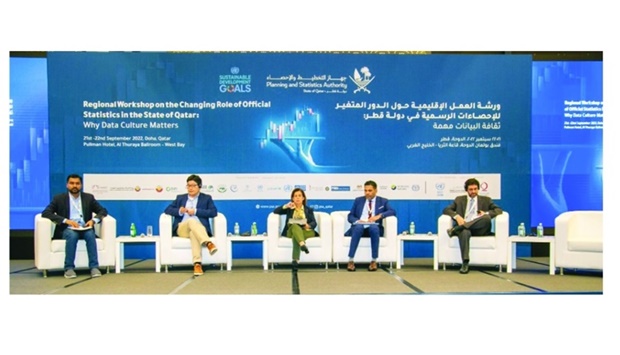The Qatar Computing Research Institute (QCRI), part of Hamad Bin Khalifa University (HBKU), recently co-organised a regional workshop with the Planning and Statistics Authority (PSA) on The Changing Role of Official Statistics in Qatar: Why Data Culture Matters.
Leveraging big data and artificial intelligence (AI) was the focus of a session organised by Dr Muhamad Imran, senior scientist at the QCRI’s Qatar Centre for Artificial Intelligence (QCAI).
Titled *Precision in Sustainable Development with Artificial Intelligence, presentations focused on the role of AI in monitoring and achieving the United Nations Sustainable Development Goals (SDGs).
The session was enriched by insights of experts from the United Nations Development Programme (UNDP), the UN Children’s Fund (Unicef), and the UN Economic and Social Commission for Western Asia (UN-ESCWA).
Lead Unicef data scientist Dr Dohyung Kim highlighted the role of AI and high-resolution satellite imagery for accurately mapping school locations in support of the Unicef’s Giga initiative, to connect every school in the world to the Internet.
“AI has been tested to replace or supplement human efforts to gather information,” he said. “AI applied to satellite imagery could successfully identify specific building types including schools.”
“With a combination of the use of AI and human input, we can build a scalable and operational system to minimise human efforts and time [spent on] data collection and validation, and eventually develop a semi-automated system to detect objects from satellite imagery,” Dr Kim noted.
Dr Wafa Aboul Hosn, chief of the UN-ESCWA’s Economics Statistics Section, emphasised the need for integrating geospatial information and remote sensing data with regular official data production for disaster risk reduction and for monitoring the SDGs.
AI and machine learning (ML) have a role in monitoring global advancement toward SDGs, said senior UNDP adviser for digital transformation Dr Aladdin Shamoug.
Highlighting how AI and ML can help monitor SDGs in various data-scarce regions, regional UNDP adviser on SDG Integration Dr Gonzalo Pizarro said: “The evolving understanding of sustainable development is posing new challenges, increasing the level of complexity for development decision-makers.”
“The statistical community must explore ways to respond to these demands, among other ways, by identifying how to use big data and AI/ML applications to support decision making,” he said. “This must include addressing potential negative impacts of AI/ML applications.”
QCAI scientist Dr Imran said: “AI-enabled technology can be an accelerator for achieving the UN SDGs in a wide range of sectors and situations ranging from environmental impact to climate change.”
“Different forms of AI solutions are rapidly changing how we live and work,” he said. “Some examples include AI-based precision agriculture, sustainable supply chains, environmental monitoring, and enhanced disaster prediction and response.”
Leveraging big data and artificial intelligence (AI) was the focus of a session organised by Dr Muhamad Imran, senior scientist at the QCRI’s Qatar Centre for Artificial Intelligence (QCAI).
Titled *Precision in Sustainable Development with Artificial Intelligence, presentations focused on the role of AI in monitoring and achieving the United Nations Sustainable Development Goals (SDGs).
The session was enriched by insights of experts from the United Nations Development Programme (UNDP), the UN Children’s Fund (Unicef), and the UN Economic and Social Commission for Western Asia (UN-ESCWA).
Lead Unicef data scientist Dr Dohyung Kim highlighted the role of AI and high-resolution satellite imagery for accurately mapping school locations in support of the Unicef’s Giga initiative, to connect every school in the world to the Internet.
“AI has been tested to replace or supplement human efforts to gather information,” he said. “AI applied to satellite imagery could successfully identify specific building types including schools.”
“With a combination of the use of AI and human input, we can build a scalable and operational system to minimise human efforts and time [spent on] data collection and validation, and eventually develop a semi-automated system to detect objects from satellite imagery,” Dr Kim noted.
Dr Wafa Aboul Hosn, chief of the UN-ESCWA’s Economics Statistics Section, emphasised the need for integrating geospatial information and remote sensing data with regular official data production for disaster risk reduction and for monitoring the SDGs.
AI and machine learning (ML) have a role in monitoring global advancement toward SDGs, said senior UNDP adviser for digital transformation Dr Aladdin Shamoug.
Highlighting how AI and ML can help monitor SDGs in various data-scarce regions, regional UNDP adviser on SDG Integration Dr Gonzalo Pizarro said: “The evolving understanding of sustainable development is posing new challenges, increasing the level of complexity for development decision-makers.”
“The statistical community must explore ways to respond to these demands, among other ways, by identifying how to use big data and AI/ML applications to support decision making,” he said. “This must include addressing potential negative impacts of AI/ML applications.”
QCAI scientist Dr Imran said: “AI-enabled technology can be an accelerator for achieving the UN SDGs in a wide range of sectors and situations ranging from environmental impact to climate change.”
“Different forms of AI solutions are rapidly changing how we live and work,” he said. “Some examples include AI-based precision agriculture, sustainable supply chains, environmental monitoring, and enhanced disaster prediction and response.”

